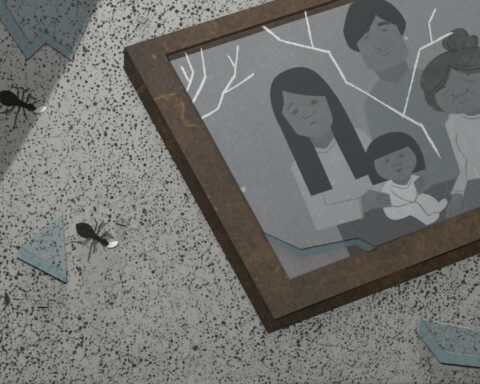This year’s Images Festival pairs two mid-length films that challenge conventional systems of control and communication. In Mere Feelings (These Feelings Are Not a Joke), Patrick Staff and Chloé Galibert-Laîné deconstruct the ways in which individuals are stifled by oppressive systems and liberated by transcending them. The two formally inventive films approach this theme on dual levels, acting at once as film texts in their own rights while serving as cultural commentaries on another. They liberate the essay from its conventional structure—your seventh grade teacher’s “hamburger essay,” these are not.
Staff’s The Prince of Homburg draws inspiration from Heinrich von Kleist’s 1810 play of the same name. The film features a cast of characters, introduced through a title card and drolly monotonous narrator, before subsequent acts eschew narrative storytelling. What follows is a dialectical exchange between characters, including transgender composer Macy Rodman, queer activist Che Gossett, and writer Sarah Schulman in the film’s most compelling interview. In between riffs on von Kleist’s The Prince of Homburg about the sleepwalking prince who navigates the constraints of 1675 social norms and a dream world that invites liberation, Staff’s film offers a fleeting exploration between the outdated codes that define contemporary mainstream society.
The Prince of Homburg draws from a larger exhibition of Staff’s work that involves sculptures, physical space, tables, and found objects. One can sense that the piece probably works better as a dialogical work that one explores, navigates, and engages with as an immersive experience. As a single-screen and, in a sense, linear format, conventional cinematic style both constrains it and draws attention to the fallacies of orthodox modes of communication. Although the characters of Staff’s film are living proof that society is more liberated that the days of the play it evokes, they’re also evidence that the conventional structures in which they live don’t yield a society that is fully free.
Chloé Galibert-Laîné’s Watching the Pain of Others offers a cinematic essay that comments upon an artist while indebting itself to her body of work. The film interrogates and engages with Penny Lane’s The Pain of Others (2016), a YouTube archival film that connects the stories of three “illness influencers” affected by Morgellons. Galibert-Laîné explains how she bailed on Lane’s film five minutes into its premiere at International Film Festival Rotterdam because the images of the vloggers made her queasy as they displayed their sores and bumps. The film offers a screen capture of Galibert-Laîné’s experience re-watching the film after graciously receiving a screening link from Lane. She endures The Pain of Others and uses it as a text to interrogate conventions of beauty and femininity, as well as the problematic currents of influencer culture that fetishize “illness” and “strength” within the online community that propels these women to pseudo-stardom.
Watching the Pain of Others is particularly interesting as a work adjacent to Lane’s oeuvre. Lane’s films, which include the Richard Nixon essay Our Nixon and the animated lark Nuts!, brilliantly reconfigure archival materials to explore the larger themes and implications of their source texts. While Watching the Pain of Others doesn’t match the playfulness and subtlety of humour of Lane’s films, it contributes an unusual essay on authorship. Perhaps better than any article, interview, or book, it adopts the approach of Lane’s work by appropriating archives, chewing on them, and moulding them into something new. As with Staff’s film, it’s a refreshingly dialogical work.
The Prince of Homburg and Watching the Pain of Others stream at ImagesFestival.com tonight at 7:00pm.












